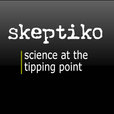181. Peter Bannister of the American Church in Paris Sees Hope For Science and Religion Dialog

Summary: Interview examines the shortsightedness of the culture war between science and religion. Join Skeptiko host Alex Tsakiris for an interview composer and lecture series co-director Peter Bannister. During the interview Bannister considers whether Christianity has lost it’s mystery: Alex Tsakiris: Modern Christianity is wed to materialism in some fundamental ways that make it hard to pull it out of there. So this is the problem I have with the dialogue with some of my Christian friends. It gets down to doctrine. I keep pushing saying, “This doesn’t make sense. You can’t really have this doctrine. You can’t really have this belief set as rigidly as that,” but their fallback is, “Well, come on, I am a Christian.” And I think there’s a direct parallel with the scientists. I think the scientists, whether they say it explicitly or not, is saying, “well, come on, I am a materialist because at the end of the day if I can’t measure it I’m out of business.” Peter Bannister: I think you’ve made some perceptive points, particularly about the marriage of convenience, or Faustian pact between Christianity and I would say Rationalism. But what’s curious if you do the history is that that’s a relatively recent phenomenon. I think that there is a very close tie to the rise of a certain type of science and a religious rationalism which insists that the doctrine really is about questions of proof and questions of discursive knowledge, propositions, dogma in the worst sense. There are a lot of historians who say that really is a very shortsighted view of what the broader tradition really is about which is much more mysterious and a little bit more fluid than that. But the people don’t actually know this tradition very well because nobody’s ever really told them. The truth that we’re after is much more relational than propositional. A lot of people in Christianity and some other wisdom traditions and faiths are saying, “Hang on. One of the big problems in the world today is that we’ve got hooked up with this notion of dogma. It’s dogma in the sense of an effort to control.” I think control is really the key thing because as soon as you have a doctrine which you say corresponds to reality in a sort of one-to-one way that gives you a method of control. Alex Tsakiris: That’s the bridge we have to cross. Science is a religion. Atheism is a religion. And now we’re all on the same playing field. Peter Bannister: Because it’s our ultimate concern. I think, a very good definition of religion. It’s what is your ultimate concern? If you go back to the idea of who do we want around this table, obviously the entry fee, as you say, is a certain ability to let go or to say, “Okay, we all bring ourselves to this but we bring ourselves to this in an open way.” My hope—and you might say I’m naïve in this—is that there is a groundswell of people who have this openness and who are genuinely interested in following and examining the data in an open and intelligent way. And I think there is a big need for the construction of a community like that. Peter Bannister's Website Play It: Download MP3 (48 min.) Read It: Alex Tsakiris: Today we welcome Peter Bannister to Skeptiko. Peter holds graduate degrees in music from King’s College, Cambridge, and philosophical theology from the University of Wales. He’s an award-winning composer and performer and is co-directing a very interesting lecture series at the American Church in Paris promoting an increased and enhanced dialogue in the relationship between science and faith. Welcome, Peter, thanks so much for joining me on Skeptiko. Peter Bannister: I’m delighted to be with you, Alex. Alex Tsakiris: Well, I’m very excited to have you on, as well. You have such a diverse background and I love the way you’ve initiated this dialogue, particularly from your position. So you’ll have to tell us a little bit about the American Church in Paris,
